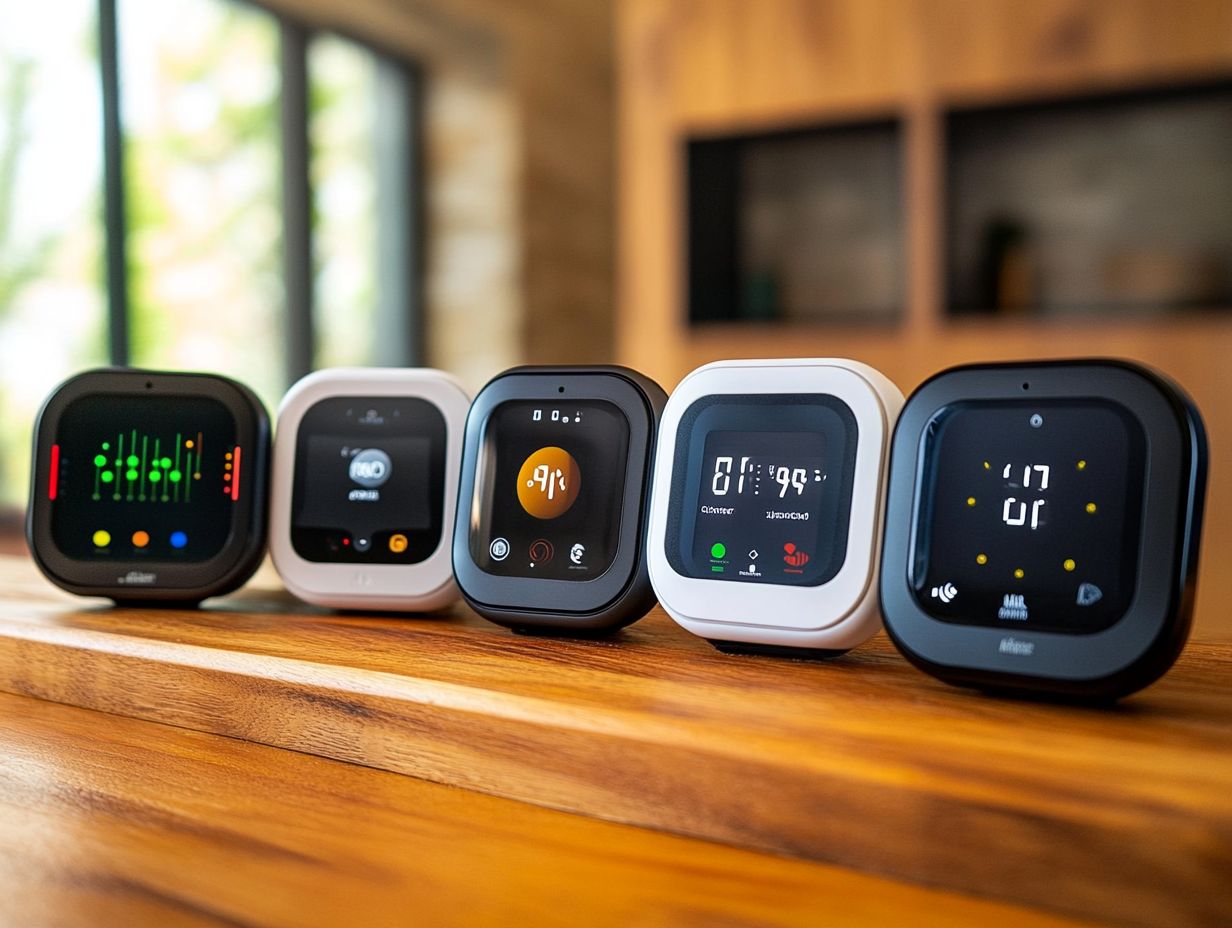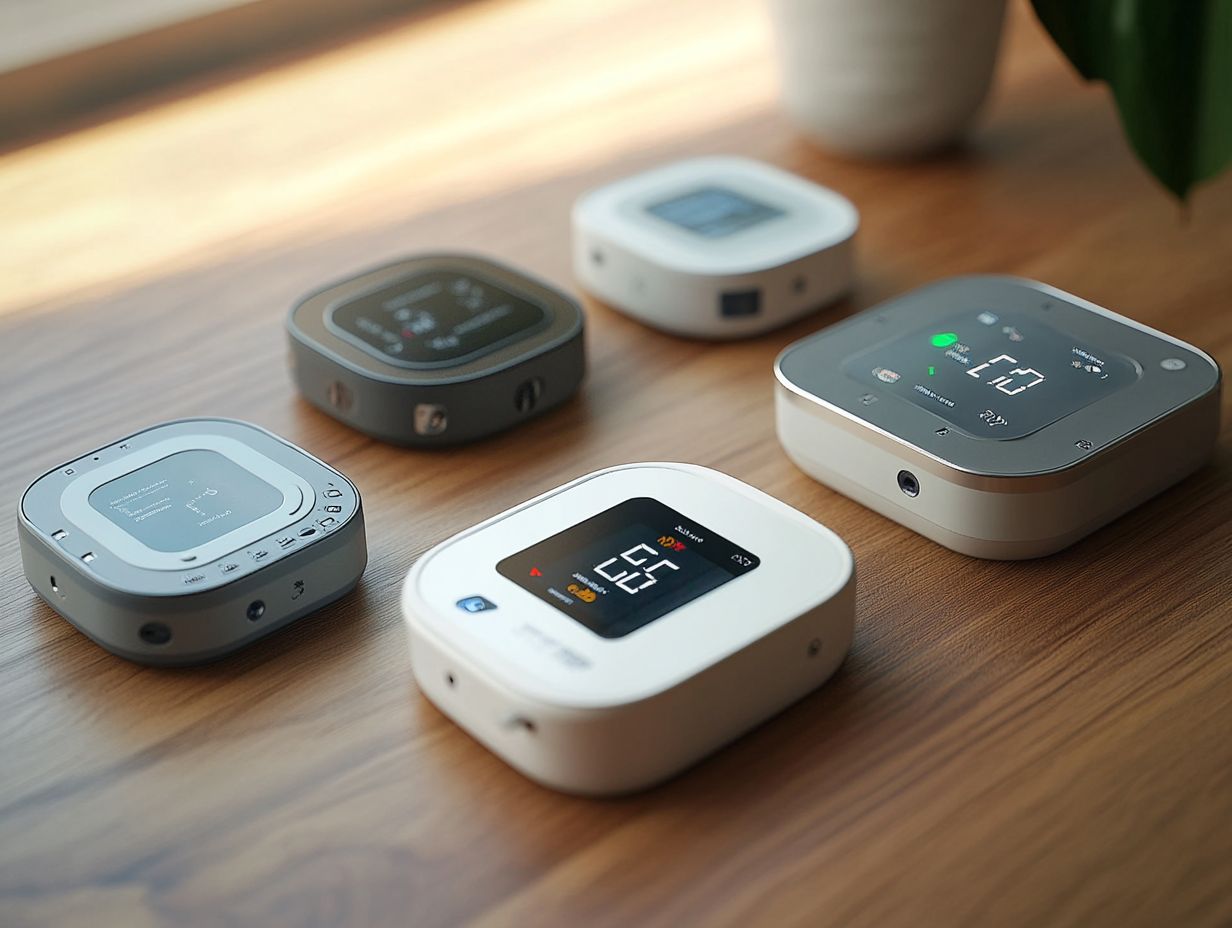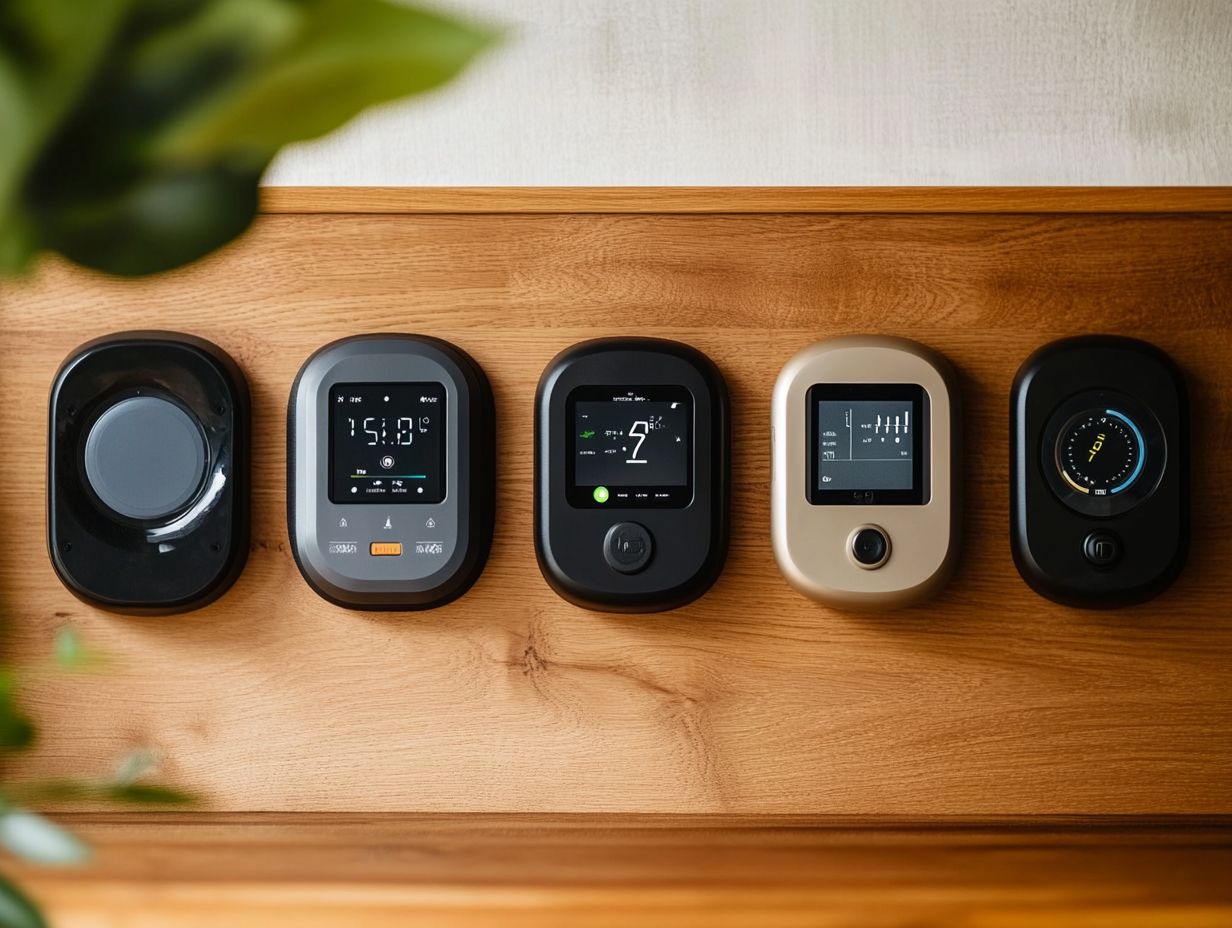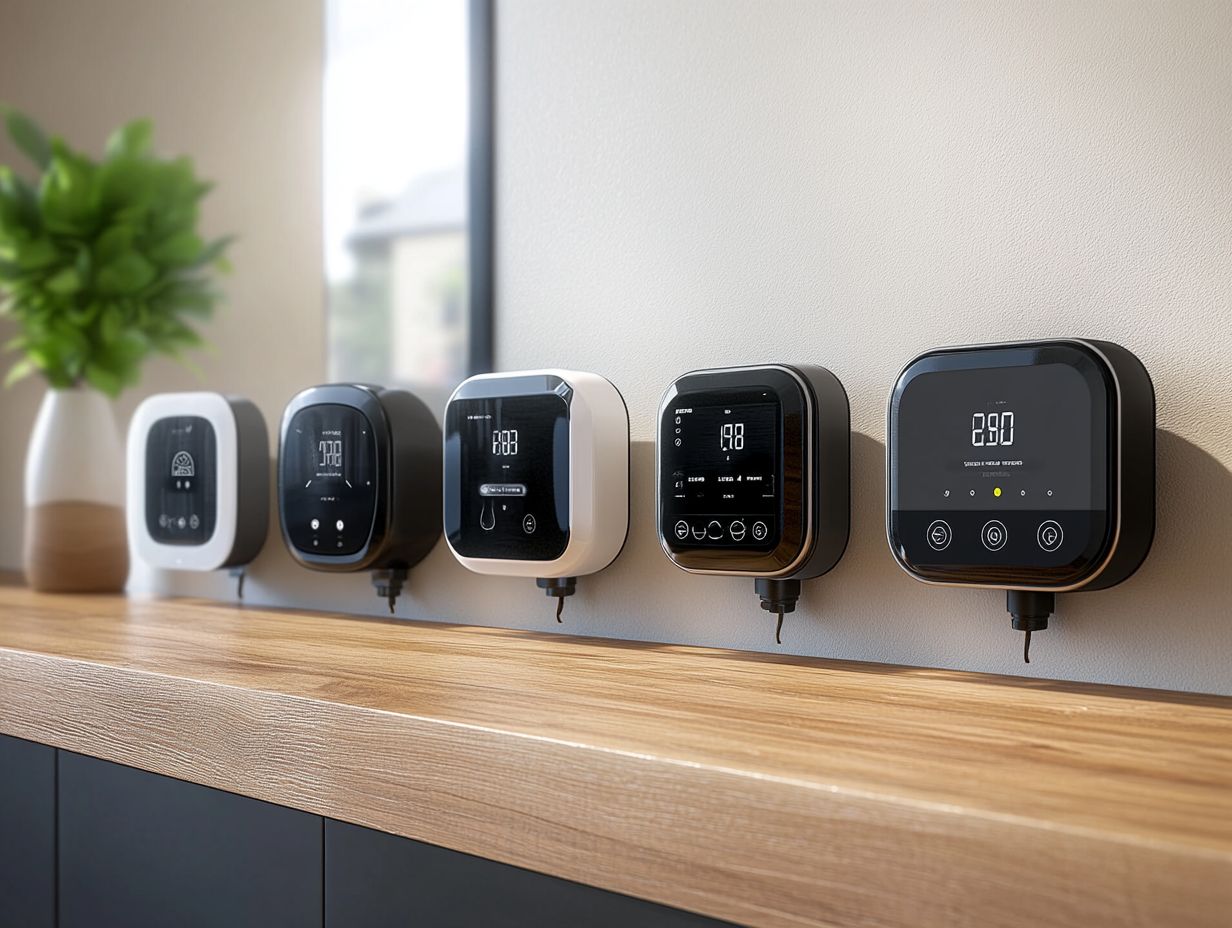Top 5 Smart Water Meters for Homeowners
In a world where technology is transforming every aspect of your daily life, smart water meters are revolutionizing the way you manage water consumption.
This article delves into what smart water meters are, how they operate, and the advantages of installing one in your home. It also outlines crucial factors to consider when choosing a meter and showcases the top five options available today.
It also covers installation, maintenance, and how these devices can help you conserve water while saving money.
Explore further to see if a smart water meter aligns with your household needs!
Contents
- Key Takeaways:
- 1. What Is a Smart Water Meter and How Does It Work?
- 2. Benefits of Installing a Smart Water Meter
- 3. Factors to Consider When Choosing a Smart Water Meter
- 4. Top 5 Smart Water Meters for Homeowners
- 5. Installation and Maintenance of Smart Water Meters
- 6. Comparison of Smart Water Meters vs Traditional Water Meters
- 7. How Can Smart Water Meters Help with Water Conservation?
- 8. Cost Analysis of Smart Water Meters
- 9. Frequently Asked Questions about Smart Water Meters
- 11. How Do Smart Water Meters Work with IoT Technologies?
- 12. Case Studies: Successful Implementations of Smart Water Meters
- 13. The Role of Smart Water Meters in Urban Water Management
- 14. Future Trends in Smart Water Meter Technology
- Frequently Asked Questions
- What are the benefits of using a smart water meter?
- Which are the top 5 smart water meters for homeowners?
- How do these smart water meters work?
- Are these smart water meters easy to install?
- Do these smart water meters require ongoing subscription fees?
- Can these smart water meters be connected to other smart home devices?
Key Takeaways:

Smart water meters track water usage in real-time, providing accurate data for better water management and cost savings. They save you money by detecting leaks, offering real-time usage data, and promoting responsible consumption. When choosing a smart water meter, consider factors such as compatibility, accuracy, and features like remote monitoring and leak detection.
1. What Is a Smart Water Meter and How Does It Work?
A smart water meter is an advanced device that uses the Internet of Things (IoT) to monitor your water usage in real-time. This not only gives you valuable insights into your consumption but also aids water utilities in effective leak detection and dynamic billing strategies.
With the help of APIs and protocols like MQTT, these meters ensure seamless data transmission.
Among smart water meters, ultrasonic models shine due to their innovative design and remarkable accuracy. They measure water flow without any moving parts, which means you can expect minimal maintenance and enhanced durability.
By connecting with IoT systems, smart water meters enable instant data sharing, allowing you to monitor your usage patterns in real-time. This feature provides you with immediate feedback on your consumption habits, significantly promoting water conservation efforts.
For water utilities, these cutting-edge meters elevate operational efficiency. They facilitate proactive leak management and ensure accurate billing, ultimately contributing to a sustainable approach to water management.
2. Benefits of Installing a Smart Water Meter
Installing a smart water meter brings a wealth of advantages. You gain enhanced real-time monitoring of your water usage, improved leak detection capabilities, and the possibility of dynamic water billing each leading to cost savings and responsible water consumption practices.
These smart devices enable you and your water utility to track and manage water usage with remarkable precision, significantly boosting efficiency.
For example, Flume helps detect leaks quickly, while StreamLab analyzes your water use to help you save.
Utilities like Thames Water and Scottish Water are already harnessing these technologies to manage resources more effectively. By adopting dynamic pricing models, they encourage users to reduce consumption and pave the way for substantial financial savings for both households and municipalities.
3. Factors to Consider When Choosing a Smart Water Meter
When searching for a smart water meter, it s essential to consider the technology used, such as IoT connectivity, and its compatibility with your existing water utility systems. Features that enhance leak detection and data reporting, especially through APIs and other integrations, should also be prioritized.
Additionally, review the installation requirements to ensure the meter fits seamlessly into your current setup without requiring extensive modifications. Data accuracy is crucial; for instance, meters like the TUF-2000M are noted for their precision in measurements and real-time data analytics.
Ease of use is equally important. An intuitive interface allows your staff to monitor and manage water usage efficiently. Furthermore, integration capabilities with your existing infrastructure can streamline operations and improve resource management, making careful selection vital.
Ready to take control of your water usage? Check out the top smart water meters today!
4. Top 5 Smart Water Meters for Homeowners
Ready to save water and money? Smart water meters can help you do just that! Homeowners like you can greatly benefit from the top five smart water meters available today. These models emphasize automated meter reading and real-time monitoring.
They also feature advanced leak detection technologies, with standout options from brands like Flume and StreamLab. These devices do more than just track your water usage; they actively aid in conservation efforts by alerting you to any unusual consumption patterns.
With their integration capabilities, you can seamlessly connect these meters to mobile apps, giving you the advantage of accessing data from virtually anywhere. Smart meters harness Internet of Things (IoT) technology to deliver insights and notifications straight to your smartphone, ensuring that you re always informed.
Many of these models are designed with user-friendly interfaces, making installation and daily use easy. With a range of price points, they cater to various budgets, making them an appealing choice for anyone looking to elevate their water management solutions.
5. Installation and Maintenance of Smart Water Meters

The installation and maintenance of smart water meters are crucial for ensuring optimal performance. You need to set up IoT connectivity correctly and conduct routine checks to maintain the accuracy of automated meter readings and leak detection functionalities.
Start by choosing an appropriate location for the meter, ideally positioned close to the main water line. During installation, it is vital to secure the device correctly; any loose fittings could result in inaccurate readings or even water leaks.
After installation, make it a habit to perform regular maintenance checks. This includes verifying connections and monitoring the data for any unusual patterns.
You can expect alerts through your connected devices, notifying you of potential issues like leaks. Familiarizing yourself with troubleshooting methods, such as resetting the device or checking for software updates, will significantly enhance the reliability and longevity of your meter.
6. Comparison of Smart Water Meters vs Traditional Water Meters
When you compare smart water meters to traditional ones, the advantages become crystal clear. Smart meters offer enhanced automated reading capabilities, superior leak detection, and real-time monitoring of your water consumption, all of which lead to improved water management.
These advancements fundamentally change how water utilities operate and connect with you, the consumer. For example, smart meters can alert utility companies the moment a leak is detected, enabling swift action that minimizes water waste and helps avoid costly repairs.
On the other hand, traditional meters often rely on manual readings, which can delay responses to leaks or unusual usage patterns. With the data reporting capabilities of smart meters, utilities can analyze consumption trends with remarkable accuracy.
This means personalized engagement for you, complete with tailored usage insights and conservation tips. Such interaction not only boosts your satisfaction but also fosters a more sustainable mindset toward water use, encouraging you to take proactive steps in managing your consumption.
7. How Can Smart Water Meters Help with Water Conservation?
Smart water meters are essential for water conservation, offering you real-time monitoring of your usage. This capability allows you to quickly identify leaks and adjust your consumption habits, promoting sustainable water practices.
These devices significantly improve efficiency in water management by sending you alerts about unusual spikes in usage, helping you pinpoint potential leaks or inefficiencies. According to a study by the American Water Works Association, cities that have adopted smart water meter technologies have seen reductions in water consumption of up to 15-20%.
This proactive approach enables you to take meaningful action while also aiding utilities in swiftly detecting leaks within the distribution system. Don t wait! Detect leaks quickly and save your resources. Ultimately, this benefits both the environment and your community’s water supplies.
Take control of your water usage today! Invest in a smart water meter and make a difference.
8. Cost Analysis of Smart Water Meters
A comprehensive cost analysis of smart water meters reveals not just the upfront investment but also the significant long-term savings potential through dynamic water billing and enhanced leak detection capabilities.
As a homeowner, you can balance your initial investment with lower monthly bills. These devices optimize your water usage and detect leaks before they lead to expensive repairs. Maintenance costs are typically low, primarily involving software updates and the occasional sensor replacement.
For water utilities, deploying smart meters offers a valuable opportunity to reduce operational costs while improving service delivery. According to market research from Fortune Business Insights , implementing smart water metering can lead to a marked decrease in non-revenue water, resulting in a favorable return on investment for both homeowners and utility companies alike.
9. Frequently Asked Questions about Smart Water Meters
This section delves into frequently asked questions about smart water meters, addressing common inquiries related to their operation, installation, benefits, and their effect on water utility services and consumer behavior.
Understanding how these devices work is essential for you, whether you’re a homeowner or a water management professional. Their technology provides valuable insights into water usage patterns and efficiency.
Many users, like yourself, often seek clear guidance on the installation process and compatibility concerns to ensure a seamless integration with existing plumbing systems. Users frequently want reassurance that their data will remain secure and free from misuse.
By organizing these concerns, you ll discover clear answers that boost your confidence in embracing smart water solutions!
11. How Do Smart Water Meters Work with IoT Technologies?

Smart water meters use Internet of Things (IoT) technology to connect and share data. This includes APIs and protocols, which are just ways for different devices to communicate efficiently. This enables automated meter readings and real-time analytics that elevate your water management experience.
Such connectivity improves data collection and facilitates smooth communication with water utilities, allowing for swift responses to issues like leaks or excessive consumption. You ll enjoy more intuitive interfaces that provide actionable insights about your water usage, helping you develop better conservation habits.
Given that these systems gather and transmit sensitive information, ensuring data security is essential to protect against unauthorized access and potential breaches. Implementing robust encryption and secure authentication protocols is critical in maintaining your trust and safeguarding data integrity in this rapidly evolving IoT landscape.
12. Case Studies: Successful Implementations of Smart Water Meters
This section showcases compelling case studies that illustrate how various water utilities have successfully implemented smart water meters, revealing the remarkable benefits gained from improved data collection, leak detection, and customer engagement.
Take Flume, for example. They ve outfitted numerous homes with smart meters that facilitate real-time monitoring, resulting in an impressive 20% reduction in water waste within just the first year. Similarly, StreamLab’s advanced water management solutions have delivered substantial cost savings for municipalities by pinpointing leaks before they escalate into larger problems.
Itron s smart metering technology has not only streamlined inventory management for utility companies but also enabled consumers with detailed data on their water usage, promoting awareness and conservation efforts.
Of course, challenges such as initial installation costs and the necessity for customer education have surfaced. Utilities are quickly devising innovative strategies to enhance service delivery while ensuring smooth transitions.
In summary, the implementation of smart water meters showcases significant benefits for both consumers and utilities, paving the way for a more efficient and sustainable water management system.
13. The Role of Smart Water Meters in Urban Water Management
Smart water meters are essential in urban water management. They offer cities vital insights into water consumption patterns, aid in leak detection, and boost overall system efficiency through Internet of Things (IoT) technology.
This technology enables city planners and water utilities to make informed decisions regarding resource allocation. Ensuring that every drop counts is crucial amid growing populations and climate change.
With real-time data analysis, you can proactively manage water resources. This enhances service delivery while minimizing waste.
Collaborating with innovative companies like United Utilities Group PLC and Global Omnium drives these initiatives forward. This enables cities to adopt sustainable practices that conserve water and reduce operational costs.
As urban areas continue to grow, using advanced solutions is crucial to meet the demands of future generations.
14. Future Trends in Smart Water Meter Technology
Emerging trends in smart water meter technology are shaping an exciting future full of advancements in IoT integration, low-power satellite communications, and enhanced automated meter reading capabilities. These innovations promise greater efficiency and a commitment to sustainability.
As these technologies develop, the implementation of Low Power Wide Area Networks (LPWAN) will ensure seamless connectivity between meters and central data systems. This connectivity will boost the accuracy of consumption tracking and enable real-time data analytics, allowing utilities to swiftly address consumer needs and effectively detect issues such as leaks.
For you, the enhancement in data analytics translates to more reliable insights into your water usage patterns. This enables you to manage both consumption and costs with greater ease.
On the other hand, water utilities will benefit from reduced operational expenses and improved resource management, ultimately elevating service delivery for everyone involved.
Frequently Asked Questions
What are the benefits of using a smart water meter?

Using a smart water meter helps homeowners track their water consumption in real-time, identify potential leaks, and save money on their water bills.
Which are the top 5 smart water meters for homeowners?
The top 5 smart water meters for homeowners are: Nest Protect, Flume Smart Home Water Monitoring System, Phyn Plus Smart Water Assistant, Rachio Smart Water Flow Sensor, and Moen Flo by Moen Smart Water Detector.
How do these smart water meters work?
These smart water meters use advanced technology such as sensors, Wi-Fi connectivity, and data analysis to track and monitor water usage. They provide real-time alerts and insights to homeowners.
Are these smart water meters easy to install?
Yes, most of these smart water meters are designed for easy installation and can be set up in just a few minutes without the need for professional help.
Do these smart water meters require ongoing subscription fees?
Some of these smart water meters may require a one-time purchase fee, while others may have ongoing subscription fees for additional features and services. It is best to research and compare the costs before choosing a smart water meter.
Can these smart water meters be connected to other smart home devices?
Yes, most of these smart water meters are designed to be compatible with other smart home devices, allowing homeowners to integrate their water usage data with other systems and control them remotely.






